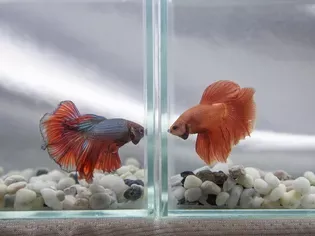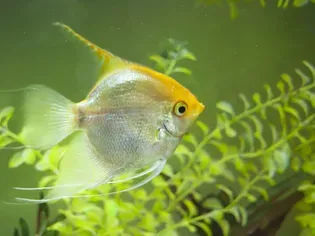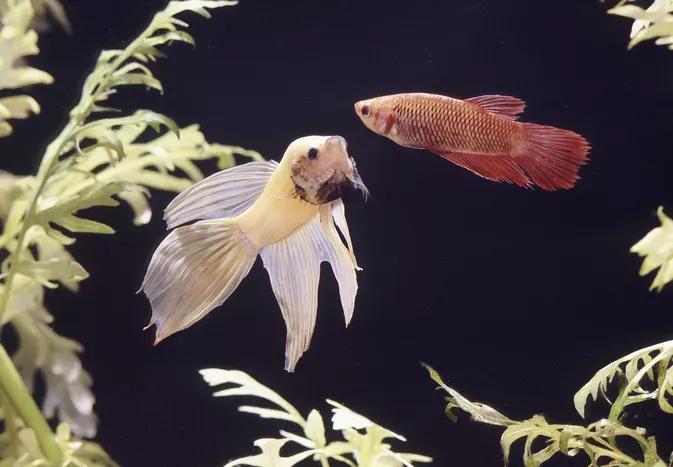Why Do Betta Fish Fight?
Updated on 04/26/24

Why Do Betta Fish Fight? A Comprehensive Guide to Understanding Betta Aggression
Betta fish, renowned for their vibrant colors and flowing fins, have captured the hearts of aquarium enthusiasts worldwide. However, beneath their captivating appearance lies a lesser-known aspect of their behavior: aggression. Understanding the reasons behind betta fish fights is crucial for providing optimal care and ensuring the well-being of these captivating creatures.
This comprehensive guide delves into the intricacies of betta fish aggression, exploring its various causes, potential consequences, and effective management strategies.
Understanding Betta Aggression
Betta aggression is a natural instinct driven by a combination of territorial and reproductive behaviors. Male bettas, in particular, display territorial aggression, fiercely defending their perceived territory from potential intruders. Female bettas, while generally less aggressive than males, may also exhibit aggressive behavior during breeding or when protecting their young.
Causes of Betta Fish Fights
Territorial Aggression:
* Bettas establish territories within their environment, which they vigorously defend against perceived threats.
* Introducing a new betta into an established territory can trigger territorial aggression.
* Overcrowding or insufficient space can exacerbate territorial disputes.
Reproductive Aggression:
* Breeding pairs of bettas may become aggressive towards each other during the spawning process.
* The male betta protects the nest and eggs from potential predators.
* Female bettas may exhibit aggression if they feel threatened or harassed by the male.
Other Causes:
* Stress: Environmental stressors, such as poor water quality, insufficient hiding places, or excessive noise, can contribute to aggression.
* Illness or Injury: Sick or injured bettas may be more likely to react aggressively due to discomfort or pain.
* Genetics: Certain betta strains may have a predisposition towards aggression.
Consequences of Betta Fish Fights
Untamed betta fish fights can have severe consequences:
* Injury or Death: Aggressive encounters can result in torn fins, lacerations, or even death.
* Stress and Disease: Prolonged aggression can lead to chronic stress, which weakens the immune system and makes bettas more susceptible to disease.
* Reduced Lifespan: Constant fighting can shorten the lifespan of bettas due to stress and injuries.
Managing Betta Fish Aggression
While it's impossible to eliminate betta aggression entirely, there are effective strategies to minimize its occurrence and mitigate its consequences:
Separate Bettas:
* The most effective way to prevent fights is to house bettas in separate tanks.
* This eliminates territorial disputes and provides each betta with its own stress-free environment.
Provide Adequate Space and Hiding Places:
* Overcrowding can exacerbate aggression. Ensure each betta has sufficient space and plenty of hiding places to retreat to when needed.
* Consider using a divided tank to provide separate territories.
Introduce New Bettas Gradually:
* When introducing a new betta to an established tank, do so gradually.
* Use a divider or acclimation box to allow the bettas to acclimate to each other's presence before fully integrating them.
Modify the Environment:
* Create visual barriers between bettas to reduce line-of-sight encounters.
* Use tall, dense plants or floating plants to break up the tank's open space.
* Avoid overcrowding with tank decorations or accessories.
Manage Stress Levels:
* Provide a stable and stress-free environment.
* Maintain optimal water quality, monitor temperature, and ensure regular water changes.
* Minimize excessive noise or vibrations near the tank.
Consider Female Bettas:
* Female bettas are generally less aggressive than males.
* If possible, consider keeping a sorority of female bettas in a larger tank with plenty of hiding places.
Conclusion
Understanding the reasons behind betta fish fights is essential for the well-being of these fascinating creatures. By addressing potential causes, mitigating consequences, and implementing effective management strategies, it's possible to minimize aggression and create a harmonious environment for your betta fish.
Remember, each betta has its unique personality and temperament. Patience, observation, and tailored care will help you provide a suitable and stress-free environment for your finned friends. Enjoy the captivating beauty and playful nature of betta fish while ensuring their safety and well-being.
Explore More Pets

Freshwater Aquarium Filters
How to Deal With Cloudy Aquarium Water

Saltwater Aquarium Filters
How Do You Remove Chloramines From Tap Water?

Freshwater Aquariums & Habitat
Can I Keep My Koi Fish Inside?

Saltwater Aquariums & Habitat
14 Best Floating Plants for Your Aquarium

Freshwater Fish Health
How to Treat Ich on Freshwater Fish

Saltwater Fish Health
Fin Rot in Aquarium Fish

Freshwater Aquarium Filters
How to Do Aquarium Water Changes

Saltwater Fish Health
How Do Fish Get Parasites?